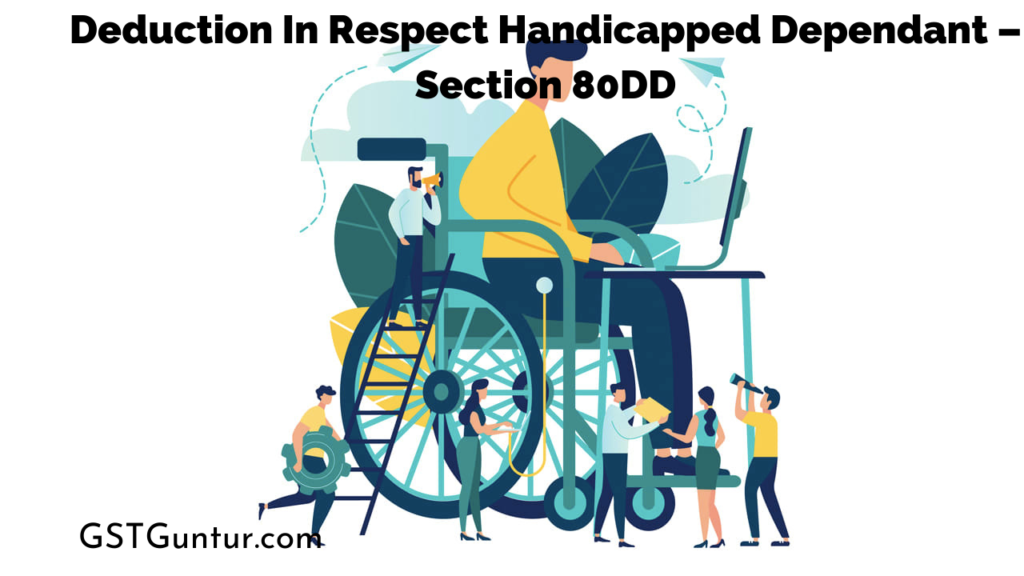Deduction In Respect Handicapped Dependant – Section 80DD: According to Section 80DD- Disabled Dependant of the Income Tax Act, 1961, individual incurring expenses for the medical treatment, nursing, training and rehabilitation of a disabled dependant can claim tax benefits. The taxpayer needs to be related to the dependant and can the dependant can be spouse, parents, children brother and sister of the taxpayer. This includes all the medical expenses incurred and also coverage of the insurance premium paid towards the insurance plan for the treatment and maintenance of the disabled dependant. A dependant in case of HUF- any member of HUF( Hindu Undivided Family) can claim tax benefits on which the dependant is mainly or wholly dependant for his support and maintenance.
Only individuals who are residents of India can claim the tax deduction under Section 80DD, therefore NRIs( Non-resident Individuals) cannot claim tax benefits under Section 80DD of the Income Tax Act, 1961.
Section 80DD is different from Section 80U as these are tax benefits claimed by a family member of the disabled dependant whereas, under Section 80U, the disabled person can claim the tax benefits himself.
Conditions for Deduction Under 80DD – Disabled Dependent
Deductions under Section 80DD of the Income-tax Act are allowed to a Resident individual or HUF for a dependent who is differently-abled and is wholly dependant on the individual for support. Following conditions need to be met in order to avail of the deductions under Section 80DD.
- The deduction is allowed for the dependant of the taxpayer only and not the taxpayer himself.
- If the defendant has already claimed for deduction under section 80U, the taxpayer is not allowed to avail of this deduction.
- The dependant in the case of the taxpayer means spouse, children, parents, brother and sister of the taxpayer and in the case of HUF, it means a HUF member.
- The taxpayer has incurred expenses for the medical treatment, training and rehabilitation of the dependant or the taxpayer may have deposited in a LIC scheme or another insurer for the maintenance of the differently-abled dependant.
- The disability of the dependant should not be less than 40%.
- The disability is defined under section 2(i) of the Persons of Disabilities Act.
Deduction Amount under Section 80DD
The deduction amount allowed under Section 80DD depends on whether the dependant is suffering from a disability or severe disability.
- Dependants suffering from Disability: The dependants with disability of less than 80% but not less than 40%, the taxpayer taking care of the medical charges of the medical dependant person with a disability can claim tax deductions up to Rs. 75,000. ( Earlier this amount was 50,000- before the financial year 2015-16)
- Dependants suffering from Severe disability- For the dependants with disability more than 80%, the family member handing the medical expenses incurred on the nursing, training and rehabilitation of the disabled dependant can claim tax deductions up to Rs. 1,25,000. (Earlier this amount was 1,00,000- before the financial year 2015-16)
Disabilities Covered
The following disabilities are covered under Section 80DD for the Income Tax Act, 1961.
- Hearing impairment
- Metal retardation
- Mental illness
- Autism
- Cerebral palsy
- Blindness
- Low vision
- Leprosy-cured
- Locomotor disability
The medical certificate for authentication of disability can be authorised by:
- A civil surgeon or Chief Medical Officer of a government hospital.
- A Neurologist with a Doctor of Medicine(MD) degree in Neurology. (If the certificate is for a child, then a pediatric neurologist with an equivalent degree).

Necessary Document to Claim Tax Deductions Under Section 80DD
The following documents need to be submitted to claim tax benefits under section 80DD of the Income Tax Act. 1961:
- Medical Certificate: The taxpayer needs to submit a copy of the medical certificate authenticating the disability of the patient.
- Form 10-1A: Form 10:1A needs to be submitted if the dependant is suffering from autism, cerebral palsy or multiple disabilities.
- Self-Declaration: The taxpayer has to submit a self-declaration certificate indicating the expenses incurred on the medical treatment of the disabled dependant that includes nursing, training and rehabilitation.
- Receipts of the Insurance Premium Paid: If the claim is being made towards the insurance policies such as the LIC scheme taken for the maintenance of the dependant then the actual receipts of the expenses need to be maintained.
Conclusion
Section 80DD- Disabled Dependant of the Income Tax Act, 1961 allows for the family members of the disabled dependant to claim tax benefits for the medical expenses incurred for the treatment, training and rehabilitation of the disabled dependent.
